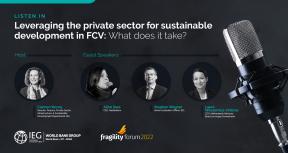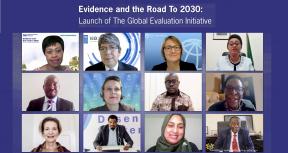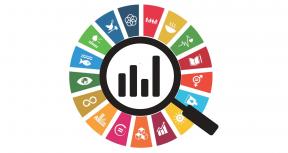IEG@50: REPLAY
As prepared for delivery
Good morning, good afternoon, or good evening.
Let me first offer a warm welcome to everyone. Thank you very much for joining us for this inaugural event of IEG@50, here in the room or online. We have an exciting program.
I am Sabine Bernabè, the new Director General for Evaluation.
Personally, I feel very fortunate that my appointment at IEG on August 1st of this year has coincided with this impressive milestone.
I have long been an admirer of IEG. It has been a global standard setter, in terms of rigor and quality of evaluations but also as regards the role and influence that evaluation can have in multilateral development banks and public institutions globally.
It is an honor to be leading IEG, and I intend to build on the exceptional work of my predecessors to strengthen the value add of evaluation as an instrument for learning, change, and enhanced effectiveness. We will have the great privilege of hearing from three former IEG Directors General later today.
I would like to talk briefly about the significance of this anniversary for the World Bank, the opportunity it presents for a discussion on how evaluation might contribute to the Evolution Roadmap, and finally the critical roles that engagement, quality, and timeliness will play in this process.
Significance of the anniversary
First, this milestone – 50 years of independent evaluation at the World Bank - is about much more than IEG.
It is about the World Bank’s long-term commitment to accountability and learning from the past for constant improvement.
We may take this for granted now, but the World Bank was very much in the vanguard in 1973 in establishing a wholly independent unit entirely dedicated to evaluating completed projects. The vision at the time was to provide an objective assessment of development effectiveness and contribute to learning from experience.
This became a standard for accountable institutions that are committed to the cycle of feedback and learning, in which self-evaluation and independent evaluation play complementary roles.
Indeed, accountability is critical for the credibility and the trust that people place in public institutions such as the World Bank all over the world.
Evaluation has a vital role to play in fostering that trust, and in strengthening the effectiveness of our institutions by bringing lessons on what is working and what is not to feed a constant cycle of learning from the past to improve development effectiveness and inform future approaches.
Objective and impartial evaluations also offer a vital input for discussions between the Board and Management on the best way of meeting the needs of client countries and will have an important role in the Evolution Roadmap.
I look forward to discussing those dynamic processes in our first panel today.
Evolution Roadmap
This brings me to my second point. This 50th anniversary comes at a critical juncture for the World Bank as it adopts a new vision and mission, backed by new operating and financing models to meet the evolving needs of its clients, and address global development challenges.
It is an opportunity to look back and take stock of the role of evaluation, and how it might evolve to help inform the way forward and help the World Bank deliver development impact more effectively and efficiently for people and the planet.
The COVID-19 pandemic drove home the need to adapt constantly in a rapidly changing and complex development landscape. The cycle of feedback loops and course correction played a vital role in this process.
We will have to determine how evaluation can best support the ambition of the new playbook, with evidence on the impact of new strategies for tackling global challenges, while staying focused on the needs of client countries. This evidence will be needed to help identify the solutions that are working to inform their scale up.
We will also need to work closely with the World Bank, the IFC and MIGA, while providing evidence on how they can collaborate more effectively. We need evidence on what contributes to working ever more effectively as ‘One World Bank’. This is critical to assemble skills and expertise, and to mobilize the volumes of private and public financing to support countries while addressing global challenges.
We will have to think about how we monitor and assess progress in increasingly difficult circumstances, and how feedback loops inform improvements and guide course correction.
Our guest for the last panel today, Dr. Sergio Firpo, Secretary for Monitoring and Evaluation of Public Policies of the Government of Brazil, will share his thoughts on how evaluation helps meet client needs while addressing those global challenges.
World Bank President Ajay Banga has called for a change in how we measure success, to focus less on the volumes of financing and more on the outcomes of the interventions supported by that financing – the outcomes for people and the planet.
I look forward to hearing the thoughts of our speakers in the first panel on how we can work together to make ‘impact our new measuring stick.’
Evaluation can play a key role in strengthening this outcome orientation.
On the one hand, by assessing and reporting on the outcomes and impacts of World Bank activities and drawing lessons on what works and what doesn’t in terms of achieving impact.
On the other hand, by working with management to enhance the focus on outcomes and impact by supporting the use of theories of change, and the building of effective monitoring and self-evaluation systems.
Engagement and quality and timeliness
Lastly, to ensure the value and utility of evaluation during this critical period, IEG must continue to provide high quality work, in a timely and user-friendly manner, and to engage with stakeholders.
I intend to listen closely to all our stakeholders, from the Board to management, operations, and client countries, to understand the questions that they are grappling with, so that we can design work programs and evaluations that deliver relevant evidence at the right time, in forms that are accessible, to help answer these questions.
Regular engagement allows us to gain a deep understanding of the context and constraints of different stakeholders so we can produce accurate, balanced, and useful evaluations.
It creates buy in and openness to learning and helps to build trust, which is important as evaluation findings can at times reveal difficult truths, requiring equally difficult conversations.
The quality and rigor of our evaluative evidence is and will remain a key ingredient for that trust.
Adopting new technologies and borrowing from a variety of data sources and methods, both at the project and portfolio level, allows us to triangulate evidence, enhance quality, and paint ever more nuanced assessments. Those innovations, which must always be guided by rigor, will be essential for informing and assessing the Evolution Roadmap on our journey toward a better, bigger, and more effective World Bank.
Closing and introduction to first panel
To conclude, IEG@50 is a welcome opportunity to launch these engagements and those reflections. I look forward to continuing them well beyond today’s event.
And now, it is my great honor to invite our first panelists to join me on stage, Anna Bjerde, World Bank Managing Director, Operations; Koen Davidse, Executive Director and Dean of the Board and Abdoul Salam Bello, Executive Director and co-chair of the Committee on Development Effectiveness.
Thank you, and I look forward to today’s discussions.





Add new comment